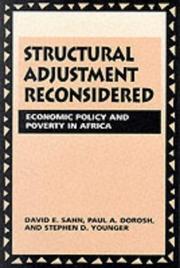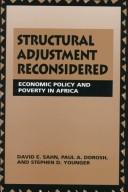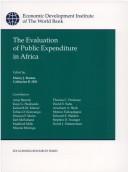| Listing 1 - 8 of 8 |
Sort by
|
Book
Year: 2021 Publisher: Washington, D.C. : The World Bank,
Abstract | Keywords | Export | Availability | Bookmark
 Loading...
Loading...Choose an application
- Reference Manager
- EndNote
- RefWorks (Direct export to RefWorks)
Eswatini has notably high levels of poverty and inequality. Recurrent, negative shocks are an important contributing factor. This study assesses the performance of the largest social assistance programs in Eswatini, based on 2016/17 national household survey data. It examines the coverage rates of these programs, and their incidence and effectiveness in reducing poverty and inequality. The study also examines the association between program participation and negative shocks reported by households, in particular, drought and food price shocks associated with the 2015-2016 El Nino event. Across programs, benefits are concentrated among poor households. However, the performance of programs in reducing poverty and inequality tends to be limited because of low intended or actual benefit levels and shortfalls in intended or actual coverage of the poor. Households that receive program benefits are more likely to report a drought shock. Except in the case of emergency food aid, which is provided ex post, we interpret this pattern to indicate that programs tend to provide ex-ante coverage to those vulnerable to this shock. At a minimum, enhancing the performance of programs in addressing poverty, inequality, and the adverse effects of shocks would require that actual benefit levels equal intended levels (for example, by procuring sufficient food commodities to meet the needs of the school feeding program) and that intended benefit levels are fully aligned with program aims (for example, by providing grant amounts to schools that are large enough to allow for tuition-free government secondary education for orphaned and vulnerable children). Absent greater budgetary allocations to programs, addressing these benefit-related disconnects may require improving the targeting of select program benefits to poorer households such as by using a proxy means test. We simulate the effects of programs on poverty and inequality reduction from such hypothetical reforms.
Book
Year: 2022 Publisher: Washington, District of Colombia : The World Bank,
Abstract | Keywords | Export | Availability | Bookmark
 Loading...
Loading...Choose an application
- Reference Manager
- EndNote
- RefWorks (Direct export to RefWorks)
This paper examines the monetary benefits and costs of the quantity of public schooling (that is, years of schooling completed) in Ghana. The paper also examines the monetary benefits and costs of some aspects of the quality of public schooling, measured by the gains in achievement produced by selected interventions in public schools. The analysis uses estimates of (i) labor-earnings returns to schooling and private spending on public schooling, based on the latest national household sample survey data; (ii) government spending on public schooling, based on administrative information; (iii) impacts on test scores, and costs, of education interventions in public schools, drawn from experimental studies; and (iv) conversions of impacts on test scores produced by education interventions to (future) labor earnings, all for Ghana. The results are a set of benefit-cost ratios in the style of the Copenhagen Consensus.
Public schools --- Public schools --- Finance --- Costs
Book
Year: 2022 Publisher: Washington, D.C. : World Bank,
Abstract | Keywords | Export | Availability | Bookmark
 Loading...
Loading...Choose an application
- Reference Manager
- EndNote
- RefWorks (Direct export to RefWorks)
This paper estimates the monetary value of financial risk reduction associated with membership in Ghana's National Health Insurance Scheme, based on recent national household survey data. The paper compares the risk premiums for distributions of out-of-pocket healthcare expenditures with and without insurance and find that the difference is small. This does not mean that the National Health Insurance Scheme has no value to members. Indeed, the findings show that the insured pay significantly less for healthcare than the uninsured on average. But that average reduction does not translate into a reduced spread of consumption net of out-of-pocket healthcare expenditures. Thus, the benefit of the National Health Insurance Scheme is entirely a transfer benefit, not a reduction in financial risk.
Book
Year: 2021 Publisher: Washington, District of Columbia : World Bank,
Abstract | Keywords | Export | Availability | Bookmark
 Loading...
Loading...Choose an application
- Reference Manager
- EndNote
- RefWorks (Direct export to RefWorks)

ISBN: 0521665132 9780521665131 Year: 1999 Publisher: Cambridge Cambridge University Press
Abstract | Keywords | Export | Availability | Bookmark
 Loading...
Loading...Choose an application
- Reference Manager
- EndNote
- RefWorks (Direct export to RefWorks)
AFR / Africa - Afrika - Afrique --- 338.340 --- 331.33 --- Algemene ontwikkeling in de Derde Wereld. --- Structureel beleid. Reglementering. Dereglementering. Ordnungspolitik. --- Algemene ontwikkeling in de Derde Wereld --- Structureel beleid. Reglementering. Dereglementering. Ordnungspolitik

ISBN: 0521584515 Year: 1997 Publisher: Cambridge Cambridge University press
Abstract | Keywords | Export | Availability | Bookmark
 Loading...
Loading...Choose an application
- Reference Manager
- EndNote
- RefWorks (Direct export to RefWorks)
Poverty --- Structural adjustment (Economic policy) --- Africa, Sub-Saharan --- Economic policy.
Multi

ISBN: 0821311638 Year: 1989 Publisher: Washington World Bank
Abstract | Keywords | Export | Availability | Bookmark
 Loading...
Loading...Choose an application
- Reference Manager
- EndNote
- RefWorks (Direct export to RefWorks)
Development aid. Development cooperation --- Africa --- Economic development projects --- Case studies --- Africa, Sub-Saharan --- Economic policy --- Case studies.


ISBN: 0821336800 Year: 1996 Publisher: Washington, D.C. The World Bank
Abstract | Keywords | Export | Availability | Bookmark
 Loading...
Loading...Choose an application
- Reference Manager
- EndNote
- RefWorks (Direct export to RefWorks)
Public expenditure --- Economic policy and planning (general) --- Africa
| Listing 1 - 8 of 8 |
Sort by
|

 Search
Search Feedback
Feedback About UniCat
About UniCat  Help
Help News
News